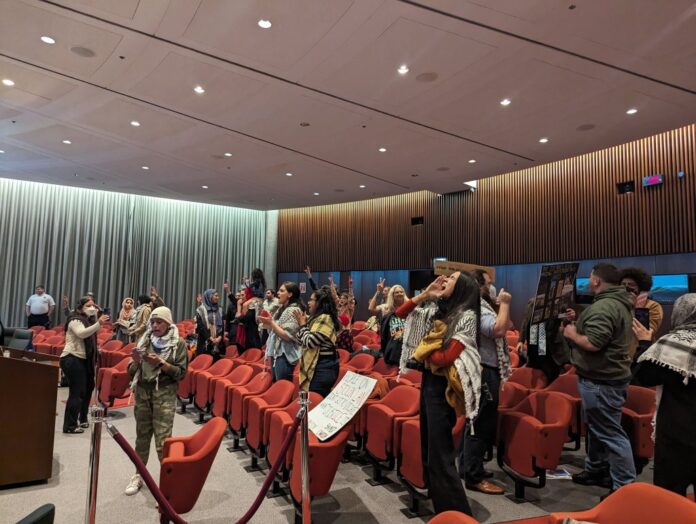
Naperville Mayor Scott Wehrli’s announcement Tuesday that the Naperville City Council will not be adopting a resolution on a Gaza ceasefire triggered such vocal opposition from audience members that the council meeting was paused for 10 minutes.
“To be clear, the city council does not intend to initiate a ceasefire resolution,” Wehrli said. “This situation is clearly outside the scope of our local municipal government.”
Wehrli spoke to the matter following another public comment period packed with pleas that Naperville elected officials issue a resolution calling for a permanent ceasefire in the war between Israel and Hamas in Gaza.
For three consecutive meetings, residents and nearby community members have pushed council members to take a stand on the Israel-Hamas War and chastised them for not addressing the issue locally.
Tuesday was the first time a council member formally responded to the ceasefire requests.
Wehrli did speak with ceasefire supporters after the council’s meeting on March 5, which adjourned to chants of “cease-fire now” and similar shouts, but this was the first time he responded to the request during a meeting.
While “we all mourn the loss of human life and hope for peace to prevail soon,” Wehrli said, it isn’t the council’s role to take a stand on an issue that has nothing to do with city government.
Thanking the crowd for their comments, Wehrli assured them their remarks have been “memorialized in the record.”
“Naperville residents have entrusted the City Council with the responsibility of determining whether official city action is appropriate, responsible and in the interest of our community,” he said, and the council is “guided by the city’s mission statement and powers and functions section of the Naperville municipal code.”
The Naperville mission statement reads, “To provide services that ensure a high quality of life, sound fiscal management, and a dynamic business environment, while creating an inclusive community that values diversity.”
After Wehrli finished speaking, a chorus of “ceasefire now!” started. Wehrli asked for order in the chambers and then called for a 10-minute break.
The crowd continued chanting long into the break but ultimately left on their own at the urging of one protestor, who encouraged the group to continue outside and allow the council meeting to continue.
In an interview after Tuesday’s meeting, Wehrli said, “We require respect and decorum in the city council chambers” so when “things like that arise, we take a break, we look for calm and an opportunity for people to take their seats or leave.
“I think people are going to choose what they choose to do,” he said, “but our position has not changed.”
That position, however, was not apparently unanimous.
Returning from the break, Councilman Ian Holzhauer questioned Wehrli’s statement.
“Mayor, just as a point of inquiry — and I’m not proposing an ordinance or anything — but you kind of spoke on behalf of council earlier by saying what we would or wouldn’t do. … Did nine council members actually tell you that? Or did all nine say that?” Holzhauer said.
Wehrli said he worked with city staff to draft his ceasefire statement, which was then forwarded to the council as a confidential memo last week. There wasn’t much feedback from members so he proceeded with his plan to make it public, he said.
Still, Holzhauer maintained he wasn’t sure that qualified as justification for moving forward.
“I just want to make clear, I do not think that we have the consensus of nine,” he said. “That was never, I think, established.”
In a texted statement Wednesday, Holzhauer said, “The mayor misspoke by proclaiming that nine council members have agreed to a position behind closed doors, which we did not, and legally could not have done.
“In reality,” he said, “there has been a lot of back and forth in one-on-one conversations between council members on this issue. It is far from accurate to say the mayor’s personal opinion represents a unanimous consensus on what to do. It is undemocratic, and against the spirit of governance in Naperville, to bypass the public process by formulating a position for the council through a confidential memorandum.”



